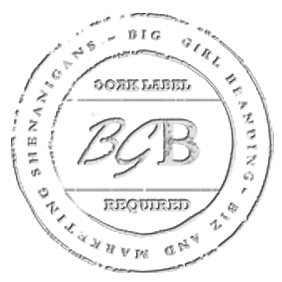This is a guest post courtesy of Clare with some great tips for writing your own web copy.
While it’s fab (and highly recommended) to hire a pro writer for help with your web copy (and other marketing materials), sometimes it’s simply beyond the budget.
At least for now. (Right?! Wink, wink, nudge, nudge.)
When that’s the unfortunate scenario, don’t despair. You CAN be a DIY until you’ve scraped together the investment money to get it done professionally.
These tips will help you be a better DIY than the average Joe.
As always, please make Clare feel welcome in the comments.
In the aftermath of Google’s steps to reward quality content it is clear that online copy is going to become increasingly important. Everything from your on-page text and company blog to your offsite efforts need a facelift.
But as an entrepreneur you might not be trained in the art of online copywriting, no matter how important it is. The truth is putting pen to paper – or finger to keyboard – is like cooking a meal.
Master the recipe and you’ll be fine
And as you get more confident, mix up the ingredients and see how creative you can really be.
Here are five top copywriting tips for beginners that will have you crafting killer copy – every time – without really trying:
Hard-Hitting Headlines
The Internet is fast-paced, and web users are increasingly lazy. Ever heard of the 80/20 rule? On average, 8 out of 10 visitors will read your headline. But only 2 in 10 will read on.
This means you only have a matter of moments to grab your audiences’ attention. In those few moments you need to give them something worth taking the time to read.
Crafting a headline that grabs attention is vital. You need to tell your readers what they will gain by reading your article. But keep enough back to keep them wanting more.
You’ve worked hard to gain your knowledge, so you want to share it. You want to give your business maximum exposure, and showcase yourself as an authority.
No matter how good the rest of your article is; if your headline fails, no-one will find out what you have to say.
Interesting Introduction
Once you’ve got those two people to read past the headline, you need to hook them in with your introduction.
Tell your reader what they will learn from your piece, and why it is important to them. When writing for your own website, you’ll already know your cliental better than anyone.
Bare them in mind when writing, and make sure everything you say is geared towards them. As an entrepreneur, your aim is to raise the profile of your company and increase your sales.
The target audience of your product or service will have unique needs and interests; make sure you appeal to those right away.
Pose a question, offer a contrarian view, or add something unique to an on-going debate. However you choose to approach your introduction, it’s a good idea to take inspiration from elsewhere.
If you’re writing a blog post, look at what the big players in your field do well. If you’re writing web copy, look at what your competitors do well – and not so well.
Content is King?
The phrase ‘content is King’ has been thrown around by online marketers, webmasters, and copywriters for a long time now.
When writing onsite and offsite copy, you need to be aware that Google is clamping down on webspam and poorly written websites.
This means no duplicate or spun content; everything should be unique, high quality, and well researched. You should write a piece you would want to read, and you’d be proud to see your name next to.
When writing for your website, make sure each page is unique – even your internal pages. Your business blog should add value to your site, providing additional information and showcasing your authority on the site.
Don’t always focus on selling your products. Give your audience valuable information they will want to share with others in the industry.
Reader First, Google Second
Getting your website onto the first page of Google is something all entrepreneurs try to do. But focusing too much on search engine optimization (SEO) can ruin all your hard work.
Black hat SEO techniques, such as keyword stuffing, will make readers leave your website right away.
Instead of focusing on Google and ranking well, always put your readers first. If they have made it as far as to read your copy, don’t confuse them with overly-optimized text.
This goes hand-in-hand with always focusing on the quality of your pieces.
Clever Call-to-Action
The conclusion of your piece is just as important as the headline, introduction, and copy.
You don’t want to ruin a well crafted piece by rushing the end. Sum up your points one final time; reiterating what they will have learnt, and why it was important.
You could finish the post with a question to your readers, or leave them hanging on for part two. If the piece is for your onsite blog, end the piece with why you can help them.
Tell the reader why they should choose to work with you, over anyone else.
As the owner of an independent or small business, you may not have the funds to draft in an additional pair of hands to handle your copywriting. But you don’t have to. Following this recipe for writing certainly won’t lead to disaster.
Practice really does make perfect, and crafting killer copy is an art you’ll be able to pick up in no time.
Halloooo there. So if you absolutely adored this post (or even just liked it, we’ll take it) please consider sharing it with your buddies.

